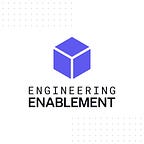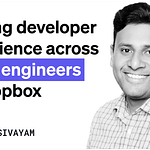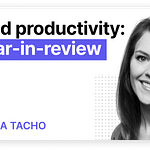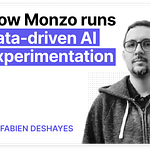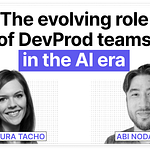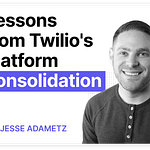Chris Chandler is a Senior Member - Technical Staff for Developer Productivity at T-Mobile. Chris has led several major initiatives to improve developer experience including their internal developer portal, Starter Kits (a patented developer platform that predates Backstage), and Workforce Transformation Bootcamps for onboarding developers faster. In our conversation, we discuss:
How focusing on developer productivity instead of happiness led to better outcomes, clearer focus, and more support
What they did to get executives to care about developer productivity initiatives
Why they created and patented Starter Kits and the broader Dev Center platform
How they built a developer platform with minimal resources
The pros and cons of how they built their platform compared to others like Backstage
Listen now on Spotify, Apple Podcasts, or getdx.com.
Some takeaways:
Early on, T-Mobile’s developer experience efforts were focused on making developers happy. “It was all foosball tables and free meals.” Over time, they realized their real goal was to increase productivity. (They later changed the team name from DevEx to DevProd.)
Chris shared his take on the difference between developer experience and developer productivity: Developer experience involves creating tools and environments that are intuitive and enjoyable for developers to use. Productivity takes it further by addressing inefficiencies and automating workflows so developers can focus on coding rather than administrative or repetitive tasks.
Developer-focused projects must connect to business outcomes, like increased delivery speed or cost savings. This helps executives view investments in developer productivity as essential, not optional.
Use data to quantify improvements, such as time saved or reduced vulnerabilities.
A key challenge for Developer Productivity teams is balancing standardization and freedom. If they standardize too much, leadership may be happy while developers are miserable. But if they offer too much freedom, developers will be happy, but governance and optimization goes out the window, so leaders will be unhappy. DevProd teams have to find a balance.
Early DevProd teams should focus on delivering small incremental wins, instead of advocating for a large team or investment. Layering success upon success will build trust and make it easier to get buy-in for larger investments over time.
One initiative T-Mobile has invested in to improve productivity is Starter Kits. Starter Kits is analogous to Backstage (although it predates Backstage); it gives developers a way to quickly set up everything they need to start working.
What sets Starter Kits apart is how much further it goes beyond just creating a repo. It’s complete with end-to-end GitLab CICD pipelines, pre-wired libraries to address non-functional requirements, and full self-service documentation.
Starter Kits work better for T-Mobile’s specific needs than Backstage, particularly for Kubernetes deployment and GitLab integration, due to differences in security, RBAC, and platform alignment.
The team leveraged existing tools and patterns, like the broader Dev Center platform and generator patterns, to build the initial version of the system with minimal resources. The project began small, leveraging existing resources and delivering quick wins before getting funding to invest more. This scrappy approach allowed the team to make progress and demonstrate wins without waiting for formal approval or funding.
Timestamps:
(0:00) Introduction
(1:30) From developer experience to developer productivity
(8:42) Getting executive buy-in for developer productivity initiatives
(24:24) What Chris’s team is responsible for
(28:18) How they’ve built relationships with other teams
(32:37) How they built and got funding for Dev Console and Starter Kits
(40:18) Homegrown solution vs Backstage
Read the full transcript here.
References:


